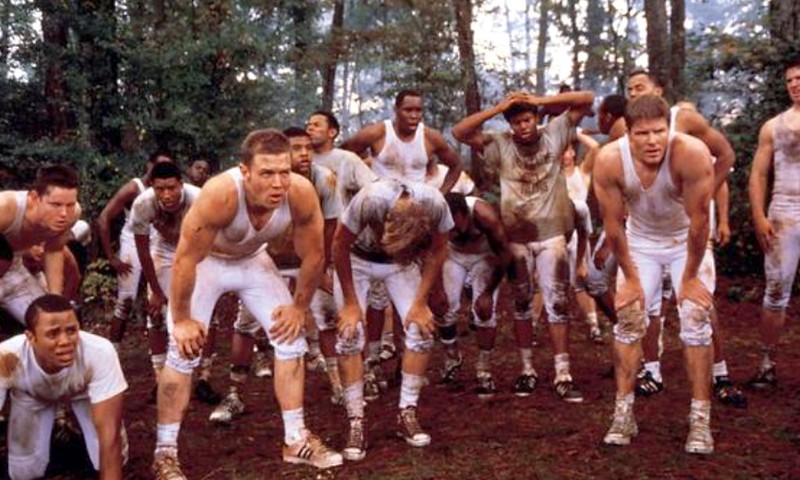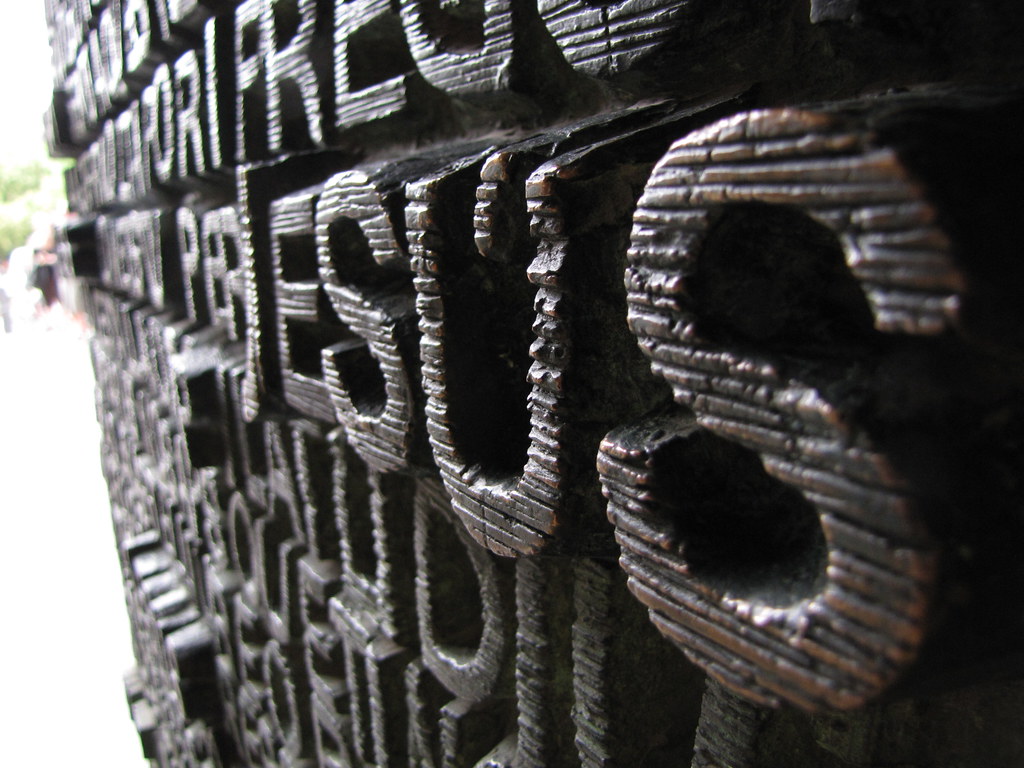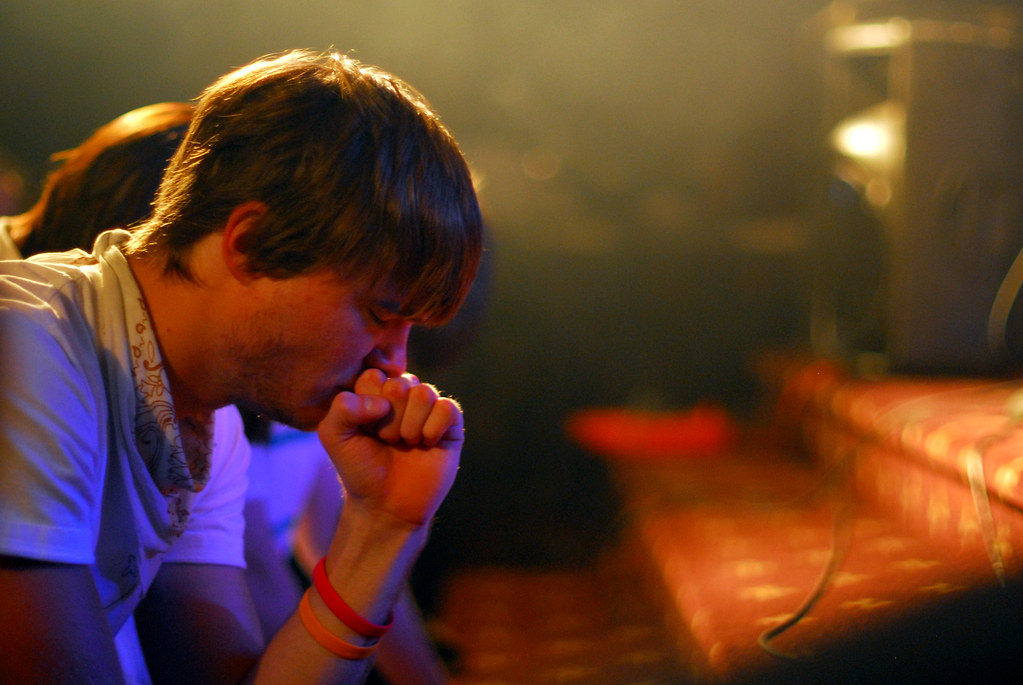What do we learn from this story in Acts 20?
Remember 'Remember the Titans'?
Culture change is tough - but it is worth it!!! I was reminded of this as I watched the movie Remember the Titans. A coach dropped into a chaotic situation must bring culture change for the team to survive... but he doesn't just want it to survive he wants it to succeed, and to dominate. In a way we want our ministries to do likewise so what ideas for culture change can we take from Coach Boon?

Thinking about sacrifice
If Jesus is King, what does that mean for what we want to do with out lives? [Image by Chris Bellerophon Dotson on flickr]

Back to the Mission
Reminded again and again about what we are created for. We are created for worship! But because there are some people who do not worship, we have been given a mission... to go and show people they were created to worship! - photo on Flickr by llamatofu

Appeasement verses Satisfaction
Do we look to appease our emotions, troubles, discomforts with earthy things that may provide some release temporarily, or do we look to God who is the source of complete satisfaction? [Image by donald_palansky_photography on flickr]

Tuesday, 31 July 2012
Open to suggestions...
What do we learn from this story in Acts 20?
Atonement & all it means (part two)
Understanding the very nature of God allows us to see why some sort of atonement was necessary in the first place. From the start we need to acknowledge these attributes of God's nature are permanent qualities. They don’t change and they can't be added to, because they have always been who God is. God's character exists outside of our own perceptions of who he is. They are what are known as objective qualities. It doesn’t matter what we think, or how we choose to interact with God, we cannot change who God ultimately is. Our belief has nothing to do with it. These objective attributes give us a baseline to refer back to on the theology of atonement.
The Greatness of God
- Spirituality
- Personality
- Life
- Infinite
- Constancy
The Goodness of God
- Purity
- Integrity
- Love
Monday, 30 July 2012
Atonement & all it means (part one)
In the atonement, we come to a crucial point of Christian faith, because it is the point of transition, as it were, from the objective to the subjective aspects of Christian theology. Here we shift our focus from the nature of Christ to his active work on our behalf; here systematic theology has direct application to our lives. The atonement has made our salvation possible... In the doctrine of the atonement we see perhaps the clearest indication of the organic character of theology, that is, we see the various doctrines fit together in a cohesive fashion. The position taken on any one of them affects or contributes to the construction of the others. Here the doctrines of God, humanity, sin and the person of Christ come together to define the human need and provision that had to be made for that need. And from our understanding of these other doctrines issues our understanding of the various facets of salvation: our being given a righteous standing in God's sight (justification); the instilling of spiritual vitality and direction into our lives (regeneration); the development of godliness (sanctification)...So this is just an introduction into the idea of the topic. I hope to break it down a bit more over a series of posts. Simply put the term 'atonement' refers to Jesus paying the price for our wrong doings. His actions on the cross we atoning because he substituted himself into a punishment we deserved and could not avoid.
The importance of all this in a theological sense is that we need to take what is objective about God (the things we can't change no matter what we believe) and then through Jesus' actions apply them to the subjective theological ideas that impact our lives. Hopefully these posts will help us understand the importance of what Jesus did, but also show us how it continues to effect the way we live each day.
Friday, 27 July 2012
Friday morning focus
Wednesday, 25 July 2012
Considerations on Baptism
The wrestle I've really been having though is those who do profess a real faith. Should I just fill up the baptismal and get dunking or do we nurture that person with some classes and teaching over time to ensure they understand what they're doing? I was very happy to be able to watch this video from The Gospel Coalition today. I'm glad I'm not the only one facing these questions.
Monday, 23 July 2012
From Inside the Theater
So I was there with them, fidgeting in my seat, some forty or fifty feet away from the man with the gun. It’s still a bit surreal, but I do know that when the seemingly endless shooting started, as my girls were struggling from whatever gas or chemical had been released, and we figured out what was happening, we hit the floor. I threw myself on top of my fourteen year old who was on the end of the row, straight up the aisle from the shooter. In that moment, as the rapid-fire shots continued, I truly thought I was going to die. And I realized that I was ready. I have put my faith and trust in Jesus Christ as the redeemer of my soul, and there wasn’t the slightest doubt that I would be received into heaven, not because of any good thing that I have done but because of His merciful nature and the death, burial and resurrection of Jesus Christ.Read the rest of this amazing article here, or go view the blog A Miniature Clay Pot.
We've been having this discussion a bit at dBay, does God cause bad things to happen to help forward his own plan and agenda? I don't think so no. I really feel that it is only the sinful human who can do something that evil (especially in the case of the Colorado shooting). God didn't orchestrate that shooting so that Marie would have this amazing insight into who her God was. If this motivates one of her daughters to grow up and use her life as a missionary in Africa... God didn't cause the shooting to motivate that. The simply fact is that God is sovereign... 100%!! He is in control of everything so even when humankind go and do something evil God doesn't loose control. He didn't want the evil to happen, he didn't cause it... but his plan is still perfect and he can use anything to motivate, focus and encourage his people to act.
Friday, 20 July 2012
Friday morning focus
Sometimes we are just too self aware and 'smart' for our own good. It makes us so self seeking and we forget who our creator and master is. Ox and donkey's do a better job of that than we do. Kind of brings you back to earth huh?
Wednesday, 18 July 2012
Perspective
Tuesday, 17 July 2012
The Concept of Change
For me the past 6 months has been a total shake up of what I was comfortable with. Moving from one church to another, into a role of leadership, I found myself having to fit in with another community's idea of 'normal' and 'comfortable'. To be honest I instantly wanted to change this environment to something that I was familiar with, something I had been comfortable with for so long - but obviously that was not an option as the people I was with now were happy where they were and would find my personal idea of the ideal community environment different and uncomfortable.
I'm still not comfortable - yet having observed the dBay idea of 'comfortable' I can see that there are some very good aspects of what they do. I can now see that each community has a unique DNA or core structure to what it does. Messing with that is dangerous. That being said, as a leader of this community, especially as the one given the responsibility to minister to the younger generations I still see the need for change in the way we do things. Those changes though aren't to reflect what I was comfortable with elsewhere, now I see how change can come about to enhance the local DNA of the group to better minister to young people.
That change is still somewhat painful however. We get so comfortable with where we are that we loose sight of how effective our ministry is. Getting comfortable and taking out eyes off the ministry, off the very mission Jesus gave the church is very dangerous. I feel even more dangerous than the risk of implementing change. I really believe that's where we need to be open to people coming from outside to give us their opinion and ideas, because they are not caught up in our comfort zone. At the moment I still feel like one of those outsiders... but now one who has been with the community long enough to understand and sympathise with it's DNA. In a sense I feel in the right place to implement change, but I am still scared of ending up with my head mounted on a wall.
Monday, 16 July 2012
Stand up and be a hero
Be Strong and Courageous
This was the memory verse 187 people all memorised last week on TeenStreet. Over the past few weeks many people within our congregation have faced different challenges. From sickness to grief, from destruction to uncertainty; there have been big trials to be faced. In many ways we stand like Joshua did, before a land flowing with milk and honey, but filled with giants who need to be overcome. Through Jesus we have been given peace with God, our own spiritual promised land. Yet because we still live here on earth we face trials and giants of many kinds.
That means there is great comfort to be had from our camp memory verse. For all the days of our life God is with us, and nothing will be able to completely overcome us. The battle against giants may be hard, but God promises us he will be with us, and if he is with us we know that eventually we will be victorious. Our responsibility is to be ‘strong and courageous’. We’re told that three times just in these verses—and why shouldn’t we be strong and courageous!? If God’s promised no one will be able to stand up against us, shouldn’t that give us all the strength and courage we need.
Yet as humans (and we see it especially in the example of Israel throughout the books of Exodus, Joshua and Judges) we forget God’s promises so quickly. We see the giants, or their walled cities, or whatever trial it is you are facing. And very quickly we forget God’s promise as they appear overshadowed by the struggles we face. We act scared and timid instead of strong and courageous. However, this memory verse gives us the answer to our human reaction. Joshua is told to meditate on the Word of God day and night. When we find ourselves meditating (not simply reading) the Word of God we are encouraged again and again by His promises. It is much easier to remain strong and courageous when you are constantly focusing on the promises God has made, and the examples of what God has done.
Serving God is the way to be ‘prosperous and successful’ - following His ways is always best - even amidst what seems hard to bear. So whatever you are facing this week, be strong and courageous, follow God and prosper!!
Friday, 13 July 2012
Settling an issue.
"Preach the Gospel at all times, use words if necessary."The quote has always bugged me because Jesus' call to the church was to go and preach the Gospel. There is an inherent use of words when preaching, or proclaiming (either is a correct translation of κηρύσσω [Mark 16:15]); so it always felt strange when someone tried to tell me that when I preach the Gospel by my actions people will be more inclined to accept it.
An article I read on The Gospel Coalition this morning settles the issue for me. For it seems St Francis never actually made this remark. And himself had quite a high view of preaching the Gospel.
None of his disciples, early or later biographers have these words coming from his mouth. It doesn't show up in any of his writings. Not even close really. The closest comes from his Rule of 1221, Chapter XII on how the Franciscans should practice their preaching:
"No brother should preach contrary to the form and regulations of the holy Church nor unless he has been permitted by his minister . . . All the Friars . . . should preach by their deeds. "
Essentially, make sure your deeds match your words. While there's a nice and good sentiment in the statement---be sure you live out the grace and truth of the Gospel---the notion as it is typically presented is neither practical, nor faithful to the Gospel of Christ. It does not align with St. Francis' own practice...
Our man clearly spent a great deal of time using his words when he preached, "sometimes preaching in up to five villages a day, often outdoors. In the country, Francis often spoke from a bale of straw or a granary doorway. In town, he would climb on a box or up steps in a public building. He preached to . . . any who gathered to hear the strange but fiery little preacher from Assisi." He was sometimes so animated and passionate in his delivery that "his feet moved as if he were dancing."
Read the rest of the article here. We should be careful when quoting someone to make sure that it is actually what they said. St Francis has been labeled quite widely, within the church, as saying something that does not line up to the evidence in his life or ministry - that's a problem for preachers today!
Friday morning focus
Wednesday, 11 July 2012
Introduction to Exodus
Abraham and his ever-expanding family were uniquely favoured people. He had known the call of God (Gen 12:1), the divine promise of innumerable descendants and land to live in (Gen 17:5, 8). His family, too, had enjoyed this favoured spiritual status with its good earthly prospects (Gen 17:7-8).
At the opening of the book of Exodus, Abraham himself was, of course, long dead (Gen 25:8), and his family, now organized under the names of the twelve sons of Abraham's grandson Jacob, was resident in Egypt. Over the years it had expanded considerable and enjoyed the good life under the patronage of Joseph, Pharaoh's deputy (Gen 41:39-46). With the death of Joseph and a change of government, however, the good times we over (Exod 1:6, 8). The Egyptian authorities had become pathologically nervous about this increase in the immigrant population and determined, first, on a policy of persecution and then ethnic cleansing and genocide (Exod 1:9-11, 22).
What had become, then, we might ask ourselves, of Israel's uniqueness, their favoured position before God, the promises made to Abraham and the prospect of their own land?These are good questions to ask, and exciting ones to explore. For we learn God is always good for the promises he makes. Yet we have responsibilities which we don't always keep. But, as in the case of the Hebrews in the start of Exodus, sometimes we find ourselves in tough situations through no fault of our own. Where is God in those times? What can we do?
I'm looking forward to expanding all this through our sermon series.
Tuesday, 10 July 2012
TeenStreet Review Video
Excellent.
TeenStreet Reflections
I'll admit I don't feel I did as well as a cabin leader as I have in the past. I struggled to build relationships with the boys in my cabin. I hadn't really met any of them before and found it hard to connect with them. It was hard to motivate them to do much at all. I feel the WEC camps of old had a much better structure to motivate cabin unity and action - maybe I just haven't found the right technique moving over to the TeenStreet camp structure.
Then halfway through I got sick... really sick! And my cabin had to function without me (since I was shaking and shivering under a mountain of blankets in my bed) and my co-leader had to take over all responsibilities. I think that really started to pull the group together - I had constant offers of help from all the boys, and when I finally got myself out of bed they were always there ready and willing to carry things or just help me get from one place to another. They then started doing those things for each other as well, then conversations started going deeper and we were really able to nut out some of the issues facing 16 year old guys in the world today.
Then on the last day (seemingly from nowhere) came the motivation to perform a memory verse - the boys worked hard and that night I think we delivered the best verse of the camp. Again I need to be honest and say I was quite surprised by this group of boys.
Maybe it had something to go with the messages given over the week. This idea that God will use us if we offer ourselves to him. That he's given us passions, and that it's those passions he will use for his work. They were good concepts. I just don't know how well they were grounded to the Scripture we were using. Yet the message seemed to be received by the young people well so I pray it provides a harvest of Gospel work.
As far as dBay goes, I think it's too early to see the effect on our youth. I know those who went had a great time, and over the next few weeks I'm hoping to catch up with each personally to see what God did in their life on camp, and how that's changed the way they look at things now they are back home.
Tuesday, 3 July 2012
Shhhh time
Something that has become quite an integral part of TeenStreet is Shhhh time. After the main meeting each morning there is half an hour where no one talks to each other. There is no noise at all as everyone - campers, leaders and service team - all find a place on their own, sit, and reflect on what God has been saying to them.
Leslie Dam is secluded enough that for this entire time all you hear is the sounds of nature. It is amazing 200 people can be so silent. It is a testiment to the power and intimacy of God that he can interact with each of us so individually and personally.
Wherever you are today, maybe you need some Shhh time. Don't plan anything... or take a devotional book... just sit in quiet and ask God to speak to you. He may give you a passage to read or just want to you take the time resting in him.
Learn from the 200 people on this camp... God speaks to each of us.
(posted from Samsung Galaxy SII)







